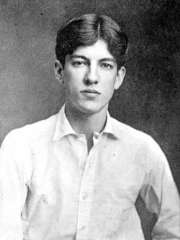Страница: 1
A Message to America
:
 Стихотворения 2009-01-26 (5583 Показы) Стихотворения 2009-01-26 (5583 Показы)
After an Epigram of Clement Marot
:
 Стихотворения 2009-01-26 (5568 Показы) Стихотворения 2009-01-26 (5568 Показы)
All That's Not Love . . .
:
 Стихотворения 2009-01-26 (5563 Показы) Стихотворения 2009-01-26 (5563 Показы)
An Ode to Antares
:
 Стихотворения 2009-01-26 (5447 Показы) Стихотворения 2009-01-26 (5447 Показы)
Antinous
:
 Стихотворения 2009-01-26 (5306 Показы) Стихотворения 2009-01-26 (5306 Показы)
Ariosto. Orlando Furioso, Canto X, 91-99
:
 Стихотворения 2009-01-26 (5274 Показы) Стихотворения 2009-01-26 (5274 Показы)
At the Tomb of Napoleon
:
 Стихотворения 2009-01-26 (5229 Показы) Стихотворения 2009-01-26 (5229 Показы)
Bellinglise
:
 Стихотворения 2009-01-26 (5718 Показы) Стихотворения 2009-01-26 (5718 Показы)
Broceliande
:
 Стихотворения 2009-01-26 (5559 Показы) Стихотворения 2009-01-26 (5559 Показы)
Champagne, 1914-15
:
 Стихотворения 2009-01-26 (5507 Показы) Стихотворения 2009-01-26 (5507 Показы)
Coucy
:
 Стихотворения 2009-01-26 (5603 Показы) Стихотворения 2009-01-26 (5603 Показы)
Do You Remember Once . . .
:
 Стихотворения 2009-01-26 (5194 Показы) Стихотворения 2009-01-26 (5194 Показы)
Eudaemon
:
 Стихотворения 2009-01-26 (5621 Показы) Стихотворения 2009-01-26 (5621 Показы)
Fragments
:
 Стихотворения 2009-01-26 (5768 Показы) Стихотворения 2009-01-26 (5768 Показы)
I have a Rendezvous with Death
:
 Стихотворения 2009-01-26 (8226 Показы) Стихотворения 2009-01-26 (8226 Показы)
Paris
:
 Стихотворения 2009-01-10 (6071 Показы) Стихотворения 2009-01-10 (6071 Показы)
Sonnets (I)
:
 Стихотворения 2009-06-12 (5394 Показы) Стихотворения 2009-06-12 (5394 Показы)
Sonnets (II)
:
 Стихотворения 2009-06-12 (5441 Показы) Стихотворения 2009-06-12 (5441 Показы)
The Deserted Garden
:
 Стихотворения 2009-01-10 (5476 Показы) Стихотворения 2009-01-10 (5476 Показы)
To England at the Outbreak of the Balkan War
:
 Стихотворения 2009-06-12 (5259 Показы) Стихотворения 2009-06-12 (5259 Показы)
Страница: 1 |
|

|
|
|
|
Биография Alan Seeger
Alan Seeger, born on June 22, 1888 and died July 4, 1916, was an American poet who also fought in World War I.
Born in New York, Seeger moved with his family to Staten Island at the age of one and remained there until the age of ten. In 1900, his family moved to Mexico for two years, which influenced the imagery of some of his poetry. His brother Charles Seeger, a noted musicologist, was the father of the American folk singer, Pete Seeger.
Seeger entered Harvard in 1906 after attending several elite preparatory schools, including Hackley School. At Harvard, he edited and wrote for the Harvard Monthly. After graduating in 1910, he moved to Greenwich Village for two years, where he wrote poetry and enjoyed the life of a young bohemian.
During that time, he attended soirées at the Mlles. Petitpas\' boardinghouse (319 West 29th Street), where the presiding genius was the artist and sage John Butler Yeats, father of the poet.[1]
Having moved to the Latin Quarter of Paris to continue his seemingly itinerant intellectual lifestyle, on August 24, 1914, Seeger joined the French Foreign Legion so that he could fight for the Allies in World War I (the United States did not enter the war until 1917). He was killed in action at Belloy-en-Santerre, famously cheering on his fellow soldiers in a successful charge after being hit several times himself by machine gun fire. One of his more famous poems, I Have a Rendezvous with Death, was published posthumously. Indeed, a recurrent theme in both his poetic works and his personal writings prior to falling in battle was his desire for his life to end gloriously at an early age.
Seeger\'s poetry was not published until 1917, a year after his death. Poems, a collection of his works, was relatively unsuccessful, due, according to Eric Homberger, to its lofty idealism and language, qualities out of fashion in the early decades of the twentieth century.
Poems was reviewed in The Egoist, where the critic commented that \"Seeger was serious about his work and spent pains over it. The work is well done, and so much out of date as to be almost a positive quality. It is high-flown, heavily decorated and solemn, but its solemnity is thorough going, not a mere literary formality. Alan Seeger, as one who knew him can attest, lived his whole life on this plane, with impeccable poetic dignity; everything about him was in keeping.\" The man who wrote this review of Poems was T. S. Eliot, Seeger\'s classmate at Harvard.
|




